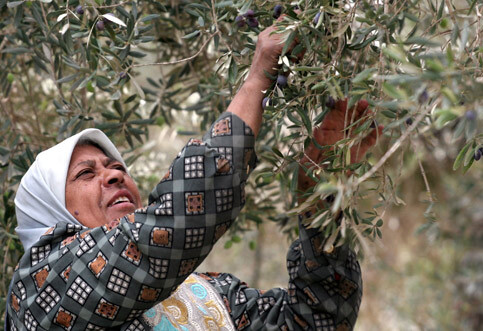United Nations 4 November 2006

A Palestinian woman harvests olives in the village of Beit Wazan near the West Bank city of Nablus, 2 November 2006. (MaanImages/Rami Swidan)
Olives, a centuries-old mainstay of the Palestinian economy, are in peak season for harvest from the middle of October to the beginning of November. Forty-five percent of Palestinian agricultural land (228,560 acres/914,235 dunums) is planted with olive trees.
This year’s olive harvest is a source of hope for a community with over 2/3 of its population living in poverty (less than $2.7/day). As a bumper crop year, the olive industry promises to contribute over 118 million USD (based on 2003/4 figures) to the fragile West Bank economy - 22 percent of total agricultural production.
The Olive Picking Process
There are an estimated nine million olive trees in the oPt, which have the potential to produce around 43,000 metric tons of oil. The picking is a labour-intensive process requiring thousands of workers and almost a month of daily work. Consequently, more than half of the Palestinian population participate in the olive harvest with extended families and their children spending weeks in the fields in a festive manner. After the laborious harvest is completed, the next stage is for the farmers to send the fresh olives to the press. This must be done quickly, otherwise the quality of oil is reduced. Once the oil is pressed and packaged, farmers need access to markets to sell their goods.
Access to Fields and Markets
Israeli movement restrictions, like the closures and the Barrier, which Israel has stated are meant to protect Israeli citizens, raise concerns over the ability of Palestinian farmers to complete this cycle. Palestinian farmers face over 500 physical obstacles and closures affecting access to fields, markets and processing. The 703 km long Barrier (now 57% percent completed) presents a further obstacle to farmers in harvesting their olives. It is estimated that 85,000 dunums of olive trees, approximately one million trees, will be inaccessible or access restricted behind the Barrier once the route is completed.
Destruction and Uprooting of Trees
Palestinian farmers working in their fields have in the past faced incidents of crop theft, tree uprooting, harassment and physical attacks, at times fatally, by Israeli settlers and the IDF. In the 2004 peak olive harvest season, some farmers were prevented by settler violence and the IDF to access their olive groves. In addition, hundreds of thousands of olive trees have been uprooted by the IDF since September 2000 - many for the construction of the Barrier. The International Court of Justice opined in 2004, that Israel has the obligation to make reparation for any damages caused to Palestinian farmers, and where possible to “return the land, orchards, olive groves and other immovable property seized from any natural or legal person for purposes of construction of the wall.”
Ensuring Access and Protection
As a military occupying power, the Israeli army is obligated to ensure public order and life in the occupied territories. In August 2002, the Israeli government reaffirmed to the UN Secretary General’s Special Humanitarian Envoy Ms. Catherine Bertini its commitment to allow farmers access to their lands during the olive harvest. Following continued access problems and harassment of farmers, the Israeli High Court ruled in June 2006 that, “protecting the security and possessions of the local residents is among the most basic obligations of the military commander in the field.” Accordingly, Israeli Defense Minister Amir Peretz was quoted as directing the IDF to assign all necessary human resources to protect Palestinian citizens, and instructing the comptroller of the defense establishment to scrutinize activities in the territories during the upcoming harvest.
Surplus of Unsold Oil
In the 2003 non-peak year harvest, there was a surplus of 10,000 metric tons of olive oil- approximately US $35 million that went unsold. Prices fell below cost price, heavily affecting farmers. In the 2004 bumper harvest, WFP purchased surplus olive oil to help maintain the olive oil prices and absorb the excess, thus supporting farmers and cushioning them from the loss of profit.
United Nations and the Olive Harvest
The UN recognizes the significance of the olive sector for the Palestinian economy in promoting the right to enjoy an adequate standard of living and in reducing poverty as well as the industry’s potential impact on the overall humanitarian situation - particularly in the health and food sectors and on children. Each year, the UN provides more than US $1 million in assistance to support the Palestinian olive economy and is working to coordinate and facilitate access for farmers to their fields.
Facts and Figures for 2006
Picking the Olives
Going to the Olive Press
Olives and Palestinian Economy - Marketing the Olive Oil
Source of Data: United Nations Development Programme (UNDP), World Food Programme (WFP), UN Office for the Coordination of Humanitarian Affairs (OCHA).